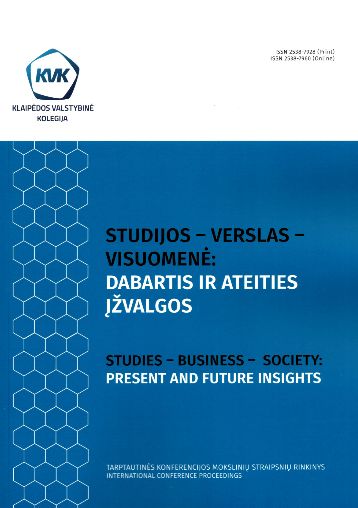THE EXPRESSION OF TOURISTS' BEHAVIOUR IN CHOOSING SERVICES IN THE CONTEXT OF SUSTAINABLE DEVELOPMENT
DOI:
https://doi.org/10.52320/svv.v1iVII.227Keywords:
sustainable consumption, sustainable tourism, sustainable developmentAbstract
Irresponsible attitude towards the planet and activities on it led society to global problems: water, air, soil pollution; greenhouse effect; loss of biological diversity; depletion of (non-renewable) natural resources. The most obvious negative impact of tourism was and is on the natural and cultural environment, and on the objects and individuals in it (Lancaster, 2021). The negative impact on the environment occurs due to the insufficiently responsible attitude of the tourism service provider and the consumer (including the tourist) towards consumption habits. Considering the above-mentioned current issues, the authors of this research aimed to determine the attitude of Lithuanian residents who choose trips abroad and the representatives of tourism companies offering those trips to the sustainable development of tourism, sustainable consumption behaviour and habits.
The problem of the research. The research tried to find answers to the following problematic questions: what is the approach of tourism companies to the creation of sustainable tourism products and their offer to consumers?; what is the behaviour and habits of Lithuanian tourists when choosing trips abroad in the context of sustainable development?; what factors influence tourists to choose sustainable tourism services, including trips abroad?
The object of the research is the interpretation of tourists' behaviour when choosing services in the context of sustainable development.
The aim of the research is to analyse the behaviour of tourists when choosing services in the context of sustainable development.
The objectives of the research:
- To analyse the concept of sustainable development in the tourism business.
- To theoretically examine the factors determining sustainable consumption behaviour.
- Determine the attitude of tourism service providers towards sustainable development and sustainable consumption behaviour.
- To study the behaviour and habits of Lithuanian tourists when choosing trips abroad in the context of sustainable development.
Research collection and data analysis methods. Analysis of scientific literature, qualitative and quantitative research. Research data were processed and displayed using SPSS and Microsoft Excel programs.
The results of the research. The authors present the following research conclusions:
- Sustainable development is defined as meeting the needs of the present society without posing a threat to meeting the same needs of future generations. Sustainable development is characterized by specific principles: environmental protection, balanced economic growth, social welfare. The goal of sustainable tourism is to maintain a balance between the tourist and the surrounding environment, rationally using environmental resources, maintaining the social and cultural authenticity of the area and the well-being of the local community.
- Sustainable consumption behaviour in tourism is related to a certain behaviour of a person/tourist, which is characterized by altruism, justice, frugality, and pro-ecology. In tourism, the essence of sustainable consumption behaviour is defined by such aspirations as: reducing the use of resources, reducing environmental pollution, promoting the use of renewable resources, supporting the local community, etc. Sustainable consumption behaviour is influenced by two groups of factors: external and internal. The group of extrinsic factors includes contextual, structural, and social factors, while intrinsic factors are related to the user's personality. Certain researchers in tourism refer to the above-mentioned factors as push and pull factors. Both pull and push factors also influence the decision to consume or not consume a sustainable tourism product.
- The attitude of travel agencies towards sustainable tourism and services is positive, but, to date, there is no greater supply of sustainable tourism services to customers on the market, and the demand itself is also passive. Travel agencies contribute weakly to the sustainable development of tourism, they only encourage tourists to be interested in and look for environmentally friendly tourism products: to visit historical objects, observe nature or something else. According to the representatives of travel agencies, sustainable tourism is still a new concept in the tourism business, and it is difficult to follow the principles of sustainable tourism, because customers are looking for a price-quality ratio, comfort, etc. It also became clear that the implementation of the concept of sustainable development in the travel business depends to a large extent on advertising, pricing, education (external factors), which influence or could in the future influence consumer decision-making more.
- After surveying tourists, it was found that women react more sensitively to environmental problems and support sustainable development in tourism more than men. Aspects of sustainable development are important for all age groups, not only in tourism, but also in social life. Persons with higher education show a greater desire to preserve the natural, cultural, and social environment. The size of the price of sustainable tourism services, regardless of the received monthly income, affects all respondents when choosing tourism services. The research revealed the most important aspects of sustainable consumption behaviour, it is important for the respondents to reduce the amount of industrial emissions to stop global climate change, and not to damage or destroy cultural/cultural heritage objects during the provision and consumption of tourism services. Choosing sustainable tourism services is influenced by external factors: "Abundance and variety of sustainable tourism services", while the internal influence is stimulated by: "Curiosity to try and learn about sustainable tourism services". According to the opinion expressed by most respondents, choosing a sustainable tourism product helps/would help to protect the environment and people around us.
Downloads
Published
How to Cite
Issue
Section
License
Copyright (c) 2022 Rokas Juška, Remigijus Kinderis

This work is licensed under a Creative Commons Attribution 4.0 International License.
Individual articles are published Open Access under the Creative Commons Licence CC-BY 4.0, which permits unrestricted use, distribution, and reproduction in any medium, provided the original author and source are credited. Authors retain copyright in their articles, but grant Klaipėdos valstybinė kolegija the right of the first publication.

